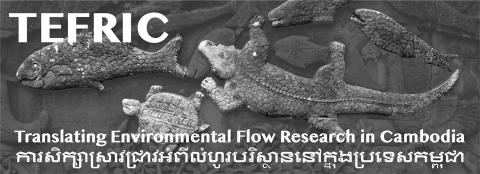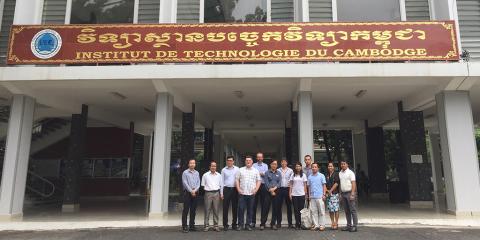Prof Julian Thompson of UCL's Department of Geography and Dr Cedric Laizé from the Centre for Ecology & Hydrology provide an update from a project aiming to introduce environmental flow concepts to Cambodia and develop tools to allow environmental practitioners to undertake environmental flow assessments...
A river’s hydrological conditions exert critical controls upon aquatic ecosystems with the variability, magnitude, frequency, duration, timing and rate of change of discharge being central to sustaining aquatic biodiversity and ecosystem integrity. In turn, a host of ecosystem services that support human populations are underpinned by healthy, functioning river systems.
However, across the globe, rivers are changing as a result of water resource developments including dams and other abstractions that modify natural flow patterns. In addition, climate change-related modifications to precipitation and evapotranspiration will inevitably induce changes in runoff and river flows although the projected nature of these changes varies by region and is often associated with considerable uncertainty.
The science of "environmental flows" has developed in response to the requirement to establish river flow regimes than can sustain healthy, functioning aquatic ecosystems and, in turn, maintain economically, socially and ecologically important ecosystem services.
A range of approaches has been developed to assess environmental flow requirements and to determine the potential impacts of hydrological change. In most cases, however, their application has been limited to more developed regions, in particular Europe, North America and Australia, and their use in developing region contexts is limited.
The science of "environmental flows" has developed in response to the requirement to establish river flow regimes than can sustain healthy, functioning aquatic ecosystems and, in turn, maintain economically, socially and ecologically important ecosystem service.
Arguably it is in these regions, where the pace of development is rapid and often increasing and where large populations are heavily reliant on water-related ecosystem services, that the need to establish environmental flows is most critical. Cambodia typifies this situation given the central role of the Mekong River and the Tonle Sap, the large lake which is both fed by and feeds the Mekong at different times of year, in the nation’s economy.
Rapid economic change and associated resource development, that includes dam construction and extensive land cover change, are likely to have major implications for the nation’s river systems.

The TEFRIC project (Translation of Environmental Flow Research in Cambodia) aims to introduce environmental flow concepts to Cambodia and develop tools that will enable scientists and environmental practitioners to undertake environmental flow assessments. The project, which is funded by the Natural Environment Research Council’s (NERC) Innovation Follow-on Programme, is a collaboration between the UCL Department of Geography (Prof Julian R. Thompson), the Centre for Ecology & Hydrology (CEH; Dr Cedric L R Laizé), the Institute of Technology of Cambodia (ITC) and the Tonle Sap Authority (TSA).
Rapid economic change and associated resource development, that includes dam construction and extensive land cover change, are likely to have major implications for Cambodia's river systems.
It builds upon long-term collaboration between UCL and CEH in the field of hydroecology, a history of UCL-based hydrological research in SE Asia that includes Mekong-wide hydrological modelling and protected area management in the Mekong Delta, as well as established institutional links between the project partners. Most notably, Dr Sarann Ly who is coordinating ITC’s contributions to the TEFRIC project, was taught by Dr Laizé when he was a lecturer at ITC between 1999 and 2001.
Ecological Risk due to Flow Alteration (ERFA)
Central to TEFRIC is the development of a user-friendly version of the Ecological Risk due to Flow Alteration (ERFA) method. This environmental flow approach, which was developed by CEH (Laizé et al 2014) and has been applied by UCL and CEH to assess the impacts and associated uncertainty of climate change through the Mekong River Basin (Thompson et al, 2014), enables a rapid assessment of the likely risk of change from historical / baseline conditions for a given future scenario using a traffic-light colour coding system. This is based on a series of metrics that characterise both high and low flow conditions.
ERFA-TEFRIC has been programmed in R and includes a user interface developed in shiny that enables rapid modification to the parameters used in the environmental flow assessment. This is designed to enable their fine-tuning based on local expert knowledge of given river systems.
The first public release of ERFA-TEFRIC v.1 took place during a workshop hosted by ITC on 18 July 2018. Participants included representatives from the Ministry of Water Resources and Meteorology, the Ministry of Environment, IUCN, Conservation International, Worldfish, the Royal University of Phnom Penh, Battambang University and the Royal University of Agriculture.

Photo: Some of the participants at the first TEFRIC workshop, ITC, Phnom Penh, 18 July 2018
A series of presentations introduced the concept of environmental flows and the range of approaches that can be used in their assessment before ERFA-TEFRIC was demonstrated through a series of practical exercises. A review of the risk of ecological change projected by ERFA-TEFRIC for a wide range of scenarios provided through UCL’s Mekong-wide hydrological modelling against participants’ expert opinions was used to fine tune the environmental flow method’s parameters as well as to identify potential new metrics for inclusion in subsequent releases.
On-going work is incorporating workshop outcomes into ERFA-TEFRIC Ver. 2 which will be launched at an event for scientists, water resource managers and decision makers in Cambodian and other Mekong riparian states in 2019. This final version of the software will also be freely available to the global hydroecological community.
Julian Thompson and Cedric Laizé
